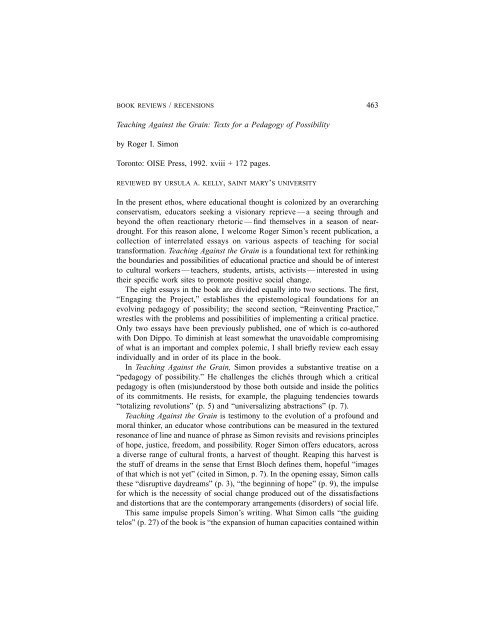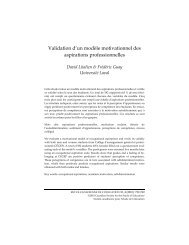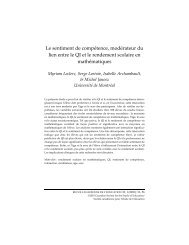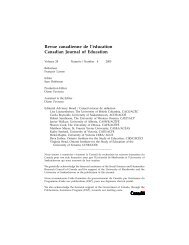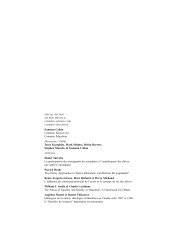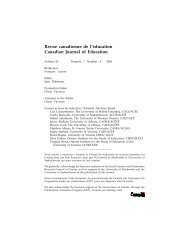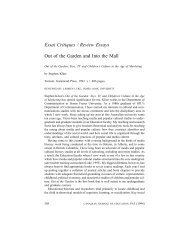Mireille Falardeau et Michel Loranger Le choix de stratégies ... - CSSE
Mireille Falardeau et Michel Loranger Le choix de stratégies ... - CSSE
Mireille Falardeau et Michel Loranger Le choix de stratégies ... - CSSE
Create successful ePaper yourself
Turn your PDF publications into a flip-book with our unique Google optimized e-Paper software.
BOOK REVIEWS / RECENSIONS 463<br />
Teaching Against the Grain: Texts for a Pedagogy of Possibility<br />
by Roger I. Simon<br />
Toronto: OISE Press, 1992. xviii + 172 pages.<br />
REVIEWED BY URSULA A. KELLY, SAINT MARY’S UNIVERSITY<br />
In the present <strong>et</strong>hos, where educational thought is colonized by an overarching<br />
conservatism, educators seeking a visionary reprieve — a seeing through and<br />
beyond the often reactionary rh<strong>et</strong>oric — find themselves in a season of neardrought.<br />
For this reason alone, I welcome Roger Simon’s recent publication, a<br />
collection of interrelated essays on various aspects of teaching for social<br />
transformation. Teaching Against the Grain is a foundational text for r<strong>et</strong>hinking<br />
the boundaries and possibilities of educational practice and should be of interest<br />
to cultural workers — teachers, stu<strong>de</strong>nts, artists, activists — interested in using<br />
their specific work sites to promote positive social change.<br />
The eight essays in the book are divi<strong>de</strong>d equally into two sections. The first,<br />
“Engaging the Project,” establishes the epistemological foundations for an<br />
evolving pedagogy of possibility; the second section, “Reinventing Practice,”<br />
wrestles with the problems and possibilities of implementing a critical practice.<br />
Only two essays have been previously published, one of which is co-authored<br />
with Don Dippo. To diminish at least somewhat the unavoidable compromising<br />
of what is an important and complex polemic, I shall briefly review each essay<br />
individually and in or<strong>de</strong>r of its place in the book.<br />
In Teaching Against the Grain, Simon provi<strong>de</strong>s a substantive treatise on a<br />
“pedagogy of possibility.” He challenges the clichés through which a critical<br />
pedagogy is often (mis)un<strong>de</strong>rstood by those both outsi<strong>de</strong> and insi<strong>de</strong> the politics<br />
of its commitments. He resists, for example, the plaguing ten<strong>de</strong>ncies towards<br />
“totalizing revolutions” (p. 5) and “universalizing abstractions” (p. 7).<br />
Teaching Against the Grain is testimony to the evolution of a profound and<br />
moral thinker, an educator whose contributions can be measured in the textured<br />
resonance of line and nuance of phrase as Simon revisits and revisions principles<br />
of hope, justice, freedom, and possibility. Roger Simon offers educators, across<br />
a diverse range of cultural fronts, a harvest of thought. Reaping this harvest is<br />
the stuff of dreams in the sense that Ernst Bloch <strong>de</strong>fines them, hopeful “images<br />
of that which is not y<strong>et</strong>” (cited in Simon, p. 7). In the opening essay, Simon calls<br />
these “disruptive daydreams” (p. 3), “the beginning of hope” (p. 9), the impulse<br />
for which is the necessity of social change produced out of the dissatisfactions<br />
and distortions that are the contemporary arrangements (disor<strong>de</strong>rs) of social life.<br />
This same impulse propels Simon’s writing. What Simon calls “the guiding<br />
telos” (p. 27) of the book is “the expansion of human capacities contained within


